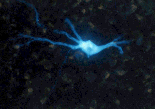| Sponsored by Wake Forest University School of Medicine and National Families in Action | |||
| Glossary - I | |||
| This glossary comes from False Messengers: How Addictive Drugs Change the Brain, by David Friedman, PhD, and Sue Rusche, Harwood Academic Publishers, Amsterdam, The Netherlands, 1999. A
| B | C
| D | E
| F | G
| H | I |
|
|||
| I Implicit memory The memories acquired through unconscious learning processes, such as operant and classical conditioning. Inhalants Any drug administered by breathing in its vapors. Most inhalants are organic solvents such as glue and paint thinner, or anesthetic gases such as ether and nitrous oxide. Inhibitory neurotransmitter A neurotransmitter that acts to prevent a neuron from firing an action potential. Inpatient treatment Residential treatment for drug addiction in a hospital or clinic.
|
|
Interneuron Any neuron that only sends its messages locally (within a millimeter or so). Many are inhibitory. Intervention The act of interrupting addiction and persuading the addict to enter treatment. Intervention counselor A person who conducts an intervention with an addict the addict's family and close friends. Intoxication Being under the influence of, and responding to, the acute effects of a psychoactive drug. Intoxication typically includes feelings of pleasure, altered emotional responsiveness, altered perception, and impaired judgment and performance.
|
|
| Home | For Journalists | For the States | Science Update | Links | Glossary | About |
Last Revision
info@addictionstudies.org

